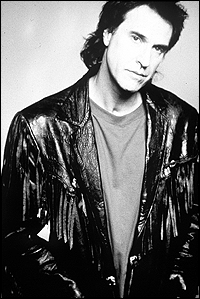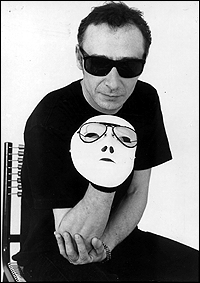Sure, writing great music is hard.
But writing a great novel or short story about music is a lot harder.
 |
|
Ray Davies writes autobiographical short stories that often end with song
lyrics.
|
You could probably spend an entire day making a list of your favorite songs. I bet making a list of your favorite music fiction won't take 5 minutes - and that might be 4 more minutes than you need.
Writing about music - an activity likened by either Elvis Costello, Erik Satie or some other wag to ``dancing about architecture'' - remains a considerable challenge for any writer, but especially writers of fiction. Nevertheless, it is hard to resist, especially for musicians turned authors like English rockers Ray Davies and Graham Parker.
As the principal songwriter for the British Invasion band the Kinks, Davies gained respect and renown for filling 3-minute pop songs such as ``Sunny Afternoon'' and ``Well Respected Man'' with writerly detail. After hearing for years that he had a writer's eye, it was no surprise that he decided to try his hand at writing words without music.
Unfortunately, Davies' first book, ``X-Ray,'' merely masqueraded as his autobiography. His overly ambitious, part science fiction approach did more to hide the real person behind the Kink than it did to inform or entertain.
Now Davies returns with a collection of short stories that is often more revealing and more autobiographical than his autobiography. ``Waterloo Sunset'' (Hyperion, $22.95), which takes its title from Davies' most beautiful song, starts out as a connected series of stories about Les Mulligan, an over-the-hill English rock star looking to make a comeback with the help of a slightly sleazy and more than slightly desperate manager. Kinks' fans can only hope that Davies feels better about himself and his accomplishments than sad sack Mulligan does.
Mulligan is an intriguing alter-ego, but halfway through ``Waterloo Sunset'' Davies abandons him. He turns instead to oddball character studies that read like attempts to expand and expound upon some of his songs - and most of his stories conclude with actual song lyrics.
 |
|
Graham Parker is sharp and funny when writing about the music business but
less so about other topics.
|
``Celluloid Heroes,'' a sort of make-believe screenplay, is merely another attempt at rendering the depressing side of the Hollywood dream, and an awkward one at that. The final story, ``Return to Waterloo,'' offers the innermost thoughts of a serial killer. I would have preferred the innermost thoughts of Ray Davies.
Graham Parker, another sharp-eyed-and-eared Brit rocker who's no longer a hot pop property, shares many of Davies' feelings, as well as literary aspirations. His first work of fiction, ``Carp Fishing on Valium'' (St. Martin's, $22.95), also begins as a series of connected short stories with a beleaguered and bewildered central figure.
At first, ``Carp Fishing'' seems as if it will trace the entire life of Parker's alter ego, Brian Porker, from childhood to rock stardom to half-forgotten oldie. Parker starts with a childhood tale about collecting bird eggs and moves on to factory work and young adulthood during the Mod years of the '60s.
But he abruptly drops this coming-of-age approach and veers off into a couple of shaggy-dog stories before hitting a high point with ``Me and the Stones.'' Suddenly Brian Porker is a middle-aged, fading rock star. He sees a newspaper headline reading ``Mick Jagger Dead'' and before you can say ``Brian Jones'' he gets a phone call from Keith Richards asking him to audition as the Stones' new singer. Does Porker want the gig? Almost as much as Steven Tyler.
Parker, like Davies, is never sharper and funnier than when writing about what he knows best: the music business. But the need to prove they are (ITAL) real writers, (END ITAL) not just rock guys having a lark, leads them away from their strengths and precisely what would most interest readers.
Bill Flanagan, rock critic turned VH1 executive, shows no such pretensions in his first novel, ``A & R'' (Random House, $23.95). He's out to take readers on a titillating swim in that shark tank known as the record industry. But there's more than dish here. This potboiler offers a course in just how corrupt - and corrupting - the music business is. It should be required reading for every aspiring musician.
But not for anyone else. ``A & R'' - short for Artist and Repertoire, a job that is part talent scout, part producer - is populated with characters as prefabricated as an 'N Sync song. They don't hold much interest. Their sleazy deals do.
It may be that music is so hard to write about because, at its best, the music itself is more intriguing and far more mysterious than the people who create it. In ``The Best of Jackson Payne'' (Knopf, $25), Pulitzer Prize-winning journalist and Tribune Publishing Co. chief Jack Fuller ponders the relationship between a man and his music, and wonders if we can ever truly know either.
Fuller's Payne is a fictional black sax great who embodies every cliche known to jazz: he's a junkie in trouble with the Mob, the law and the women who love him. Now he's dead and white musicologist Charles Quinlan sets out on a detectivelike quest to learn the truth about his life and suspicious death.
Despite all the contrasting voices Fuller uses to tell Payne's stories, his central figure never comes fully alive. But in this case, this isn't an author's failure, it's his point. Music will tell you more about a musician than all the words in the dictionary.
Back to Carp Fishing On Valium reviews